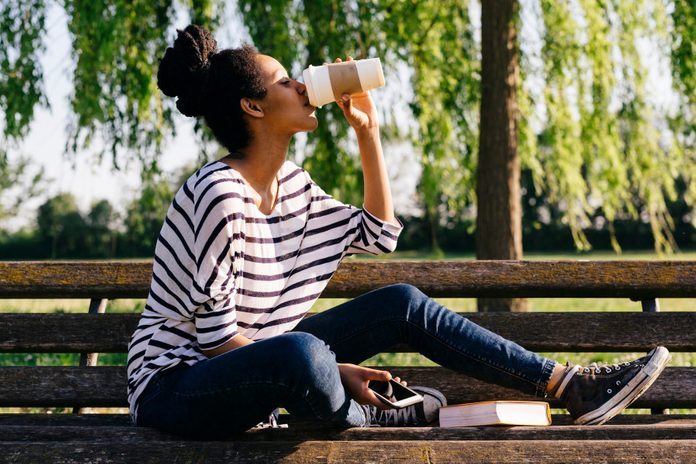Does Coffee Dehydrate You?

The caffeine content in coffee can increase your urge to pee, but does it actually dehydrate you? Our experts weigh in.
Whether you take your coffee black and piping hot or milky and iced, if you’re an avid coffee drinker, it’s probably part of your morning (and afternoon) routine.
Over 70 percent of Canadians drink coffee, according to a 2020 report by The Coffee Association of Canada.
“From the aroma to the flavour of the first sip to the stimulating caffeine hit that coffee imparts, java has become a staple in the [North American] lifestyle,” says Vicki Shanta Retelny, RDN, host of the “Nourishing Notes” podcast. “However, like everything, drinking too much coffee is not beneficial.”
So, how much coffee is too much? And can overindulging lead to dehydration?
Here, three experts break down the details of why coffee might send you to the bathroom, whether it can dehydrate you, and how to maximize the health benefits of this age-old breakfast favourite.
(Related: 7 Surprising Health Benefits of Coffee)
Does caffeine make you pee more?
If a cup of coffee sends you to the bathroom in a hurry, you’re not alone. Blame it on the caffeine. “Research indicates that caffeine can have a mild diuretic effect,” says Shanta Retelny.
Simply put: A diuretic is a substance that triggers your urge to pee. While studies haven’t unearthed the exact reason, caffeine can trigger the need to pee. “This may be more pronounced in those who are newer to drinking coffee,” Natalie King, a Chicago-based neuroscientist and medical science liaison.
Vancouver-based physician and scientific researcher Hélène Bertrand, MD, explains that caffeine “just makes your bladder more irritable” so that you feel the urge to pee sooner than you normally would.
Because drinking coffee might make you pee more often than usual, you might wonder if that means you’ll get dehydrated if you drink too much of it. First, you need to understand how much caffeine is in your cup of joe.
Caffeine content in coffee
You probably already know that coffee contains caffeine, which is a natural stimulant also found in tea, chocolate, kombucha, and more. Coffee’s caffeine content can vary from cup to cup, depending on the type of coffee bean and the preparation method.
An average 8-ounce cup of brewed black coffee contains about 95 milligrams of caffeine. Shanta Retelny recommends limiting your caffeine intake to 400 milligrams (or fewer) daily, which she says the Food and Drug Administration estimates as four to five 8-ounce cups of coffee.
Determining the best amount of coffee for you might not be so simple though. “Caffeine affects people differently,” says Dr. Bertrand. She adds that this makes it impossible to give everyone the same recommendation.
(Related: Is Black Coffee Good for You?)
Caffeine in different types of coffee
The caffeine content in coffee is not high enough to cause dehydration. However, certain coffee beans and types of coffee have a higher caffeine content, which can increase their diuretic effect. King says Robusta coffee beans tend to have more caffeine.
Some coffee retailers specifically focus on high caffeine content. On the other end of the spectrum, even decaf coffee has a small amount of caffeine.
“Individuals metabolize caffeine directly, and regular coffee drinkers will most likely build up a tolerance to caffeine and therefore experience less of the diuretic effects,” Shanta Retelny says.
So, could coffee dehydrate you?
All of our experts agree that coffee is extremely unlikely to cause dehydration.
“Unless you drink huge amounts of very strong coffee, you are not likely to get even moderately dehydrated, as every cup of coffee contains water,” says Dr. Bertrand.
“Coffee can count toward your daily fluid goals,” says Shanta Retelny. “It’s considered a mild diuretic, but the water in a typical cup of coffee appears to offset its dehydrating effects.”
In a 2014 study published in PLOS ONE, researchers compared the hydration effect of coffee with that of water among 50 men who typically drank three to six cups a day. Researchers asked the men to drink either four 200-mL cups of coffee (containing 4 mg of caffeine) or water.
The findings revealed there were no differences in hydration levels when the men drank coffee versus when they drank the same amount of water.
In other words, you don’t tend to lose much more fluid or dehydrate more easily when you drink coffee instead of water.
(Related: 10 Unexpected Things That Can Cause Dehydration)
Potential drawbacks of caffeine
Coffee isn’t dehydrating, but that doesn’t mean its caffeine content can’t cause other issues. As Dr. Bertrand mentioned, everybody has a different tolerance for caffeine.
“Most people can have up to 400 mg of coffee [4 to 5 cups] with no real consequence,” King says. “But regularly consuming beyond that can lead to issues with restlessness, shakiness, headaches, and ultimately potential dependency.”
Caffeine can also exacerbate anxiety, heartburn, and sore breasts, according to Dr. Bertrand. Shanta Retelny adds that people who are pregnant should limit caffeine to less than 200 mg per day.
The last word
Coffee contains caffeine, which could cause you to pee more often. However, our experts all agree that coffee does not contain enough caffeine to dehydrate you. But they recommend maintaining a moderate intake of coffee. For most people, that is four to five cups per day.
“If you find yourself relying on coffee to simply get you through the day, it might be a great time to reevaluate its overall effects on your health and well-being,” King says. “The bottom line is if you enjoy coffee, drink it in moderation with a touch of your favourite unsweetened milk or cream and a sprinkle of cinnamon, nutmeg, or unsweetened cocoa powder for a plant-powered flavour boost.”




